According to the Ministry of Agriculture and Rural Development, agricultural, forestry and fishery exports in the first 10 months of 2024 reached 46.28 billion USD, proving that the quality of many agricultural products of Vietnam has met the requirements of many markets around the world . This figure also proves that Vietnam's management of plant protection drugs is very transparent and effective.
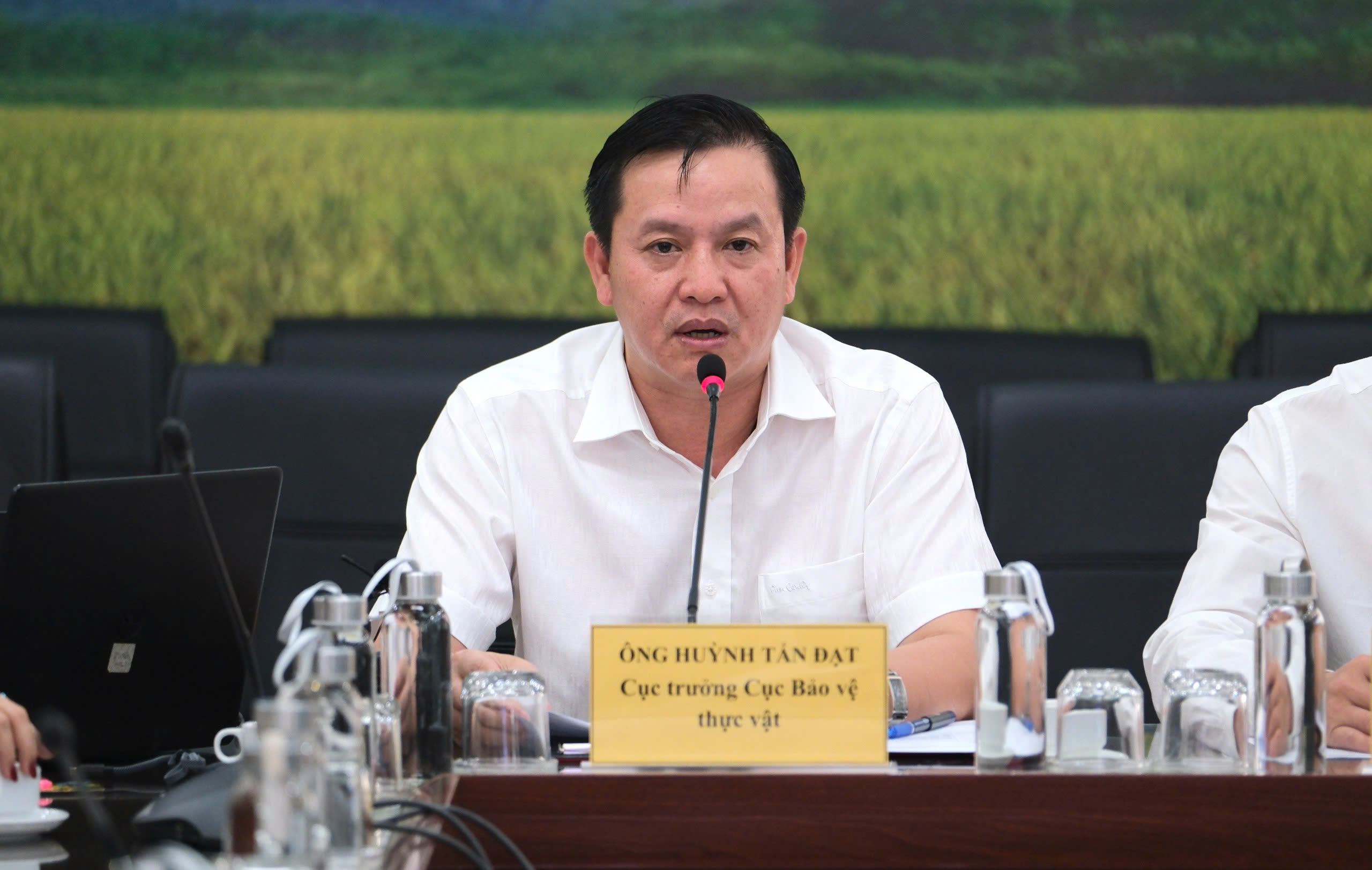
Mr. Huynh Tan Dat, Director of the Plant Protection Department (Ministry of Agriculture and Rural Development) said that the current system of legal documents and decentralization of guidance and management of plant protection drugs is very clear, transparent and convenient for both management agencies and users. Photo: NNVN.
Talking to Dan Viet about the management, research and development of plant protection drugs in recent times, Mr. Huynh Tan Dat, Director of the Plant Protection Department (Ministry of Agriculture and Rural Development) said that, implementing the policy of the Government and the Ministry of Agriculture and Rural Development on developing green, modern and sustainable agriculture, in recent times, the Plant Protection Department has actively coordinated with businesses and organizations in propagating and mobilizing people to use plant protection drugs safely and effectively; encouraging businesses to develop biological plant protection products, thereby contributing to protecting plant health, creating safe and quality agricultural products, meeting the requirements of the export market.
Recently, the Plant Protection Department and the CropLife Vietnam Association signed a cooperation plan to implement the program "Sustainable Pesticide Management Framework", aiming at the effective, safe and sustainable use of pesticides. How do you evaluate the management and development of pesticides in Vietnam in recent times?
- I think that the management and development of plant protection drugs in Vietnam in recent times has made great strides, thanks to the synchronization of the legal document system, the coordination of localities and the active participation of the business community, domestic and international associations.
Currently, the system of legal documents related to the management of plant protection drugs has been fully and synchronously built from laws, decrees to guiding circulars to ensure uniformity and harmony with regional and international standards in the process of economic integration. This creates a solid legal framework, promoting the effectiveness of state management of plant protection drugs in the direction of strict control at all stages.
In addition, the assignment and decentralization in the management and supervision of the use of plant protection drugs have been clearly and strictly regulated in legal documents to raise awareness and responsibility of users of plant protection drugs in accordance with regulations to ensure safety for people, animals, plants, the environment and food safety. With the current system of legal documents and decentralization of guidance and management of plant protection drugs, I personally evaluate that it is very clear, transparent and convenient for both management agencies and users.
Along with the development trend of the world, biological pesticides have been prioritized in the registration process. According to the provisions of the Law on Plant Protection and Quarantine, the registration and circulation of biological pesticides have had many incentive policies from granting testing licenses, conducting testing, granting registration certificates, production and transportation.
According to preliminary statistics, Vietnam currently has 95 pesticide manufacturing facilities, of which 82 factories produce biological pesticides. Currently, enterprises in the pesticide industry mainly operate in 3 forms: Importing active ingredients to produce finished pesticides from technical pesticides; importing finished products and then bottling and packaging them; and producing and processing pesticides for foreign partners.
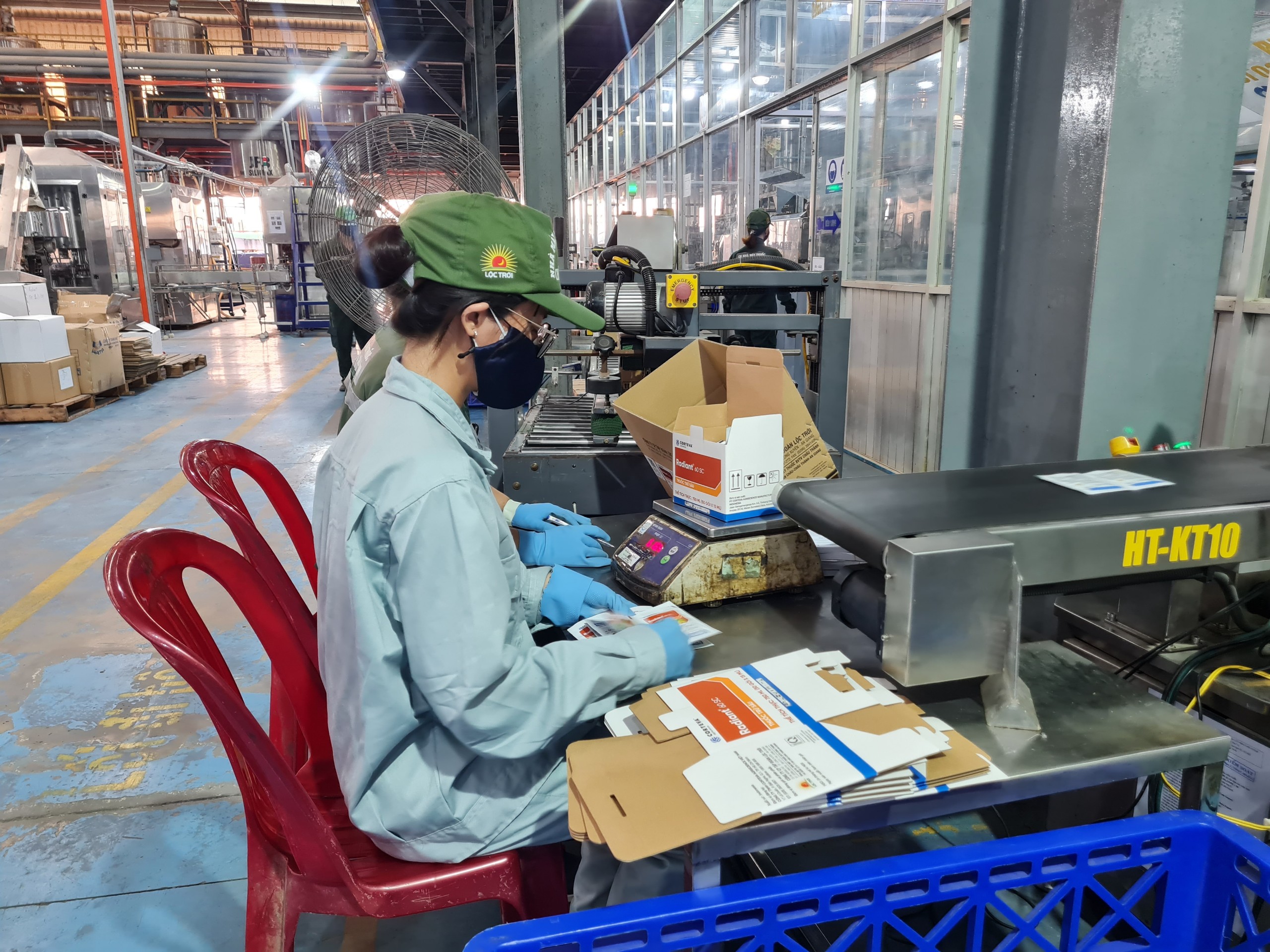
Pesticide packaging line of Loc Troi Group. Photo: KN
According to Article 48 of the Law on Plant Protection and Quarantine, every year, the Minister of Agriculture and Rural Development issues a List of permitted and prohibited pesticides for use in Vietnam. Currently, according to Circular 09/2023/TT-BNNPTNT dated October 24, 2023, there are about 4,500 registered trade names permitted for use in Vietnam, of which biological pesticides have about 810 trade names. These are highly effective pesticides, safe for use by humans, agricultural products and the environment.
In order to proactively protect human health, livestock, the environment, and the ecosystem while aiming for a green, safe, and sustainable agriculture, in recent years, the Plant Protection Department has actively reviewed and removed 14 active ingredients with high risks of affecting human health, livestock, and the environment, 1,706 trade names, and 1,265 pesticide concentrations from the List of pesticides permitted for use in Vietnam.
In the coming time, the Plant Protection Department will continue to review high-risk active ingredients, warnings from international organizations, scientists, and conventions to which Vietnam is a member, to plan for consideration and propose to the Ministry of Agriculture and Rural Development to remove them from the List of pesticides permitted for use in Vietnam. At the same time, continue to further promote training, communication, and guidance on the safe and effective use of pesticides.
How do you evaluate the results achieved in pesticide management in recent times?
Plant protection drugs are one of the inputs in agricultural production activities, along with other important inputs such as seeds, fertilizers, etc., and are a "shield" to protect crops from the effects of pests and diseases.
The management of pesticides according to international standards, with strict regulations, has contributed to building the position of many Vietnamese agricultural, forestry and fishery products in the market. This can be demonstrated through the export value of agricultural, forestry and fishery products increasing steadily over the years. It is forecasted that by 2024 it could reach 60 billion USD, a record number.
In addition, in recent times, the Ministry of Agriculture and Rural Development has continuously signed protocols for exporting agricultural products to demanding markets such as the United States, Japan, Europe and large markets such as China, which has truly demonstrated that the quality of Vietnamese agricultural products ensures safety in terms of pesticide residues. Registration and use of pesticides in farming in Vietnam have changed a lot in recent times, especially in training and propaganda on the safe and effective use of pesticides.
Currently, in the list of pesticides allowed for use in Vietnam, there are about 800 trade names of biological pesticides, accounting for about 18% of the total number of registered pesticides, this number ranks first in the group of countries in Southeast Asia and some other countries in the world. With a rich variety of species, the management of harmful organisms with biological pesticides is very convenient for farmers.
Every year, the Ministry of Agriculture and Rural Development and the Plant Protection Department review and collect warning information on active ingredients of pesticides in the List of pesticides permitted for use in Vietnam by international and domestic organizations that pose a high risk of affecting human health, the environment and have low control effectiveness. On that basis, there is a plan to review and evaluate proposals for the Ministry of Agriculture and Rural Development to remove them from the List of pesticides permitted for use in Vietnam. This is an important driving force and solution in current pesticide management activities.
In recent years, the Ministry of Agriculture and Rural Development has coordinated with businesses and organizations such as Croplife Vietnam to provide annual training on pesticide use for users on how to recognize, select and use pesticides according to the "4 rights" principle. Therefore, agricultural products, especially crops with high export value, always comply with regulations on residues, which is demonstrated through the acceptance of demanding importing countries in the world.
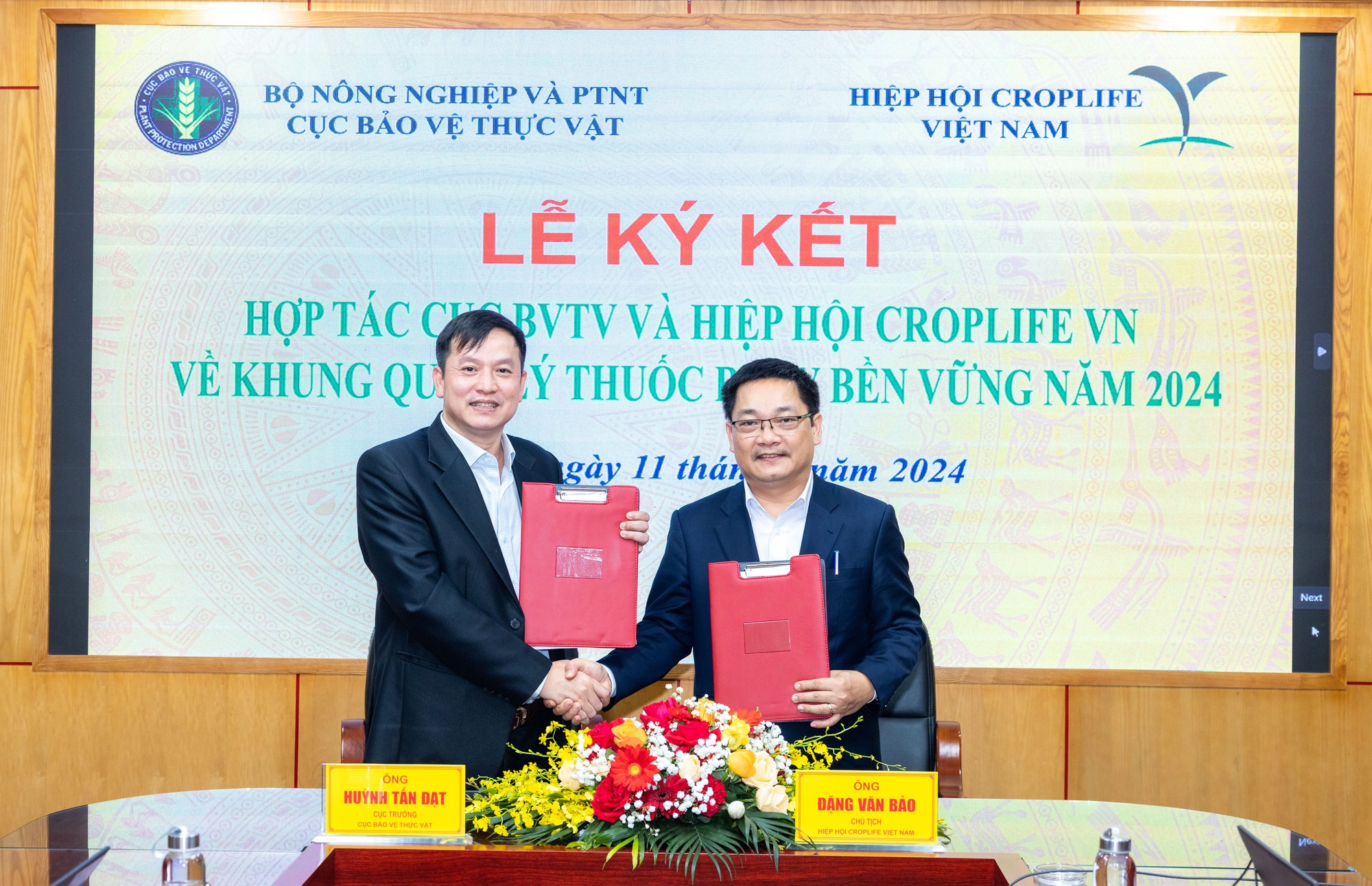
Mr. Huynh Tan Dat, Director of the Plant Protection Department and Mr. Dang Van Bao, Chairman of CropLife Vietnam signed the Cooperation Plan to implement the program "Sustainable Pesticide Management Framework" in 2024. Photo: PV
I think that the series of seminars with the theme: "Correct understanding of pesticides", in which the first seminar with the theme: "Research, development and management process of pesticides" organized by Nong Thon Ngay Nay/Dan Viet Newspaper in collaboration with the Plant Protection Department, CropLife Vietnam Association, Vietnam Pesticide Production and Trading Enterprises Association (VIPA) at 1:30 p.m. on November 8 is also one of the solutions to help farmers and cooperatives have more useful information and knowledge about pesticides and how to use pesticides, so that they can apply them effectively in production practices.
In the "Project on development of production and use of biological pesticides to 2030, vision to 2050" of the Ministry of Agriculture and Rural Development, the main goal is to increase the proportion of biological pesticides in the list of pesticides allowed for use in Vietnam to 30% by 2030 and increase the amount of biological pesticides used to 30% of the total amount of pesticides used. Could you please tell us what solutions are needed to achieve this goal?
The Project on Development and Use of Biological Pesticides to 2030, with a vision to 2050, was signed and issued by the Minister of Agriculture and Rural Development under Decision No. 5415/QD-BNN-BVTV on December 28, 2023. To achieve the project's goals, we need to implement the following solutions:
One is about policy mechanisms: Review, supplement, and perfect mechanisms to encourage and support organizations and individuals to invest in developing production, trading, and using biological pesticides. Diversify investment resources, create favorable conditions to attract domestic and foreign investment capital from many economic sectors for the development of biological pesticide production in Vietnam.
Prioritize budget allocation for research activities, technology transfer, training on drug use, communication, and development and replication of effective biological pesticide use models; funding for research and development of biological pesticide products.
Second is about science and technology: Transferring the application of biological pesticide production technology from research topics for application and registration in the List.
Encourage cooperation in research and development of biological pesticides. Enterprises should coordinate with institutes, schools and research centers to invest in research and development of new biological pesticides in Vietnam or science and technology enterprises should carry out projects in the form of public-private partnership in this field.
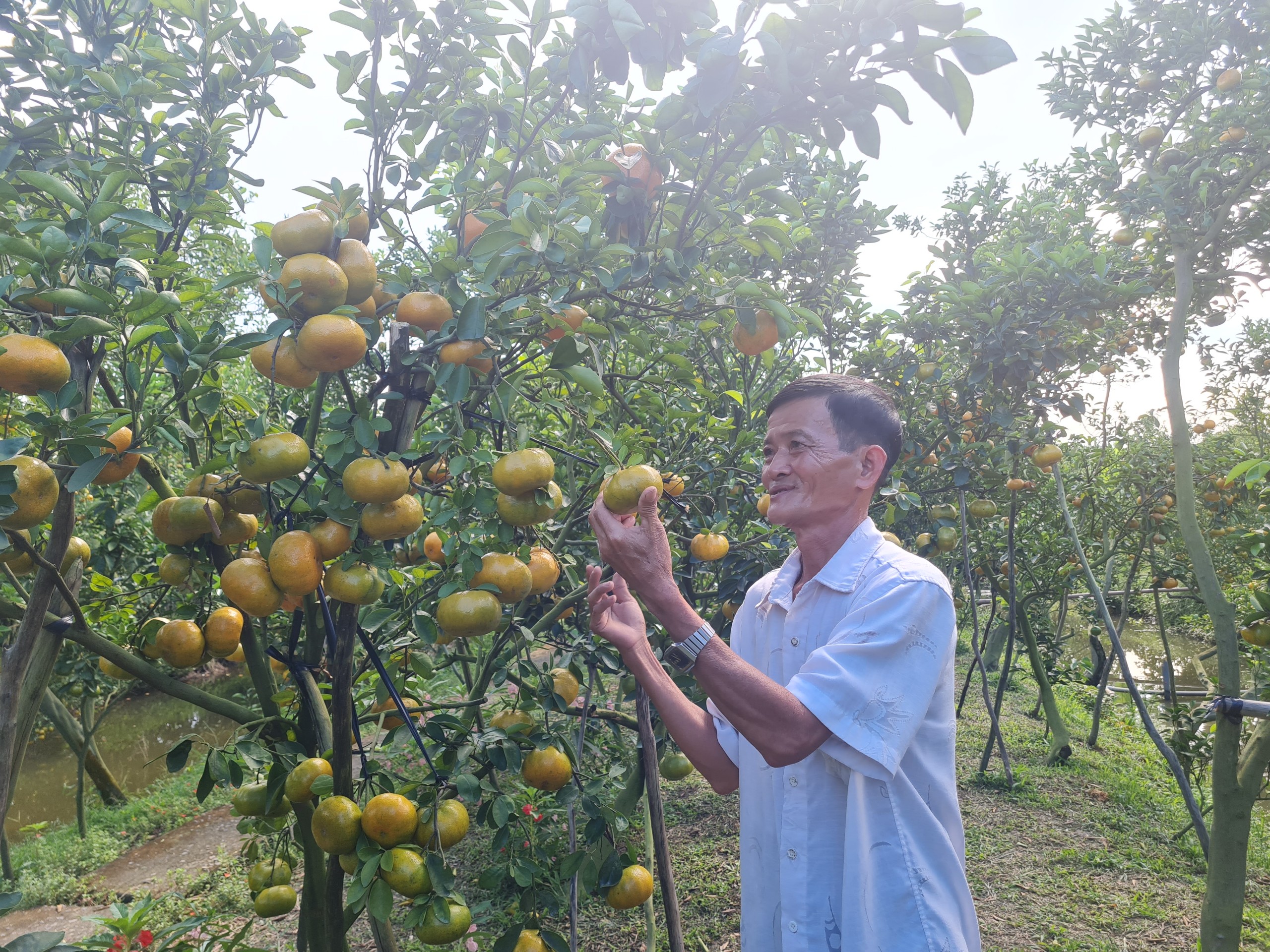
Dong Thap farmers use biological pesticides and biological products to restore Lai Vung pink grapefruit gardens. Photo: KN
Third, on training and coaching: Strengthen training, coaching and agricultural extension to change the awareness of local officials, producers, traders, and users in the use of biological pesticides.
Innovate the method of instructing the use of biological pesticides through practical models and field workshops. Coordinate with local authorities, enterprises, associations, mass organizations, and pesticide dealers to guide people on the effective use of biological pesticides.
Fourth, on information and communication: Disseminate and popularize compliance with policies, laws, legal documents, standards, regulations, policies and guidelines of the Government and the Ministry of Agriculture and Rural Development, giving priority to the development of production and use of biological pesticides, while at the same time communicating to raise public awareness and understanding of biological pesticides.
Coordinate with media agencies, associations, mass organizations, schools, research institutes, and businesses to promote and guide people in using biological pesticides. In addition, communicate to farmers to make them aware of the role and benefits of using biological pesticides.
Fifth, on public-private partnership, building models and linkage chains: Strengthen public-private partnership with the participation of enterprises, the state, industry associations and people to coordinate in the production and use of biological pesticides. Strengthen the linkage between farmers and enterprises in the production of raw material areas - production of herbal medicines.
Sixth, on international cooperation: Promote international cooperation on biological pesticides, take advantage of resources, experience and capacity of developed countries and international organizations such as FAO, WHO to develop biological pesticides; strengthen cooperation to transfer new and advanced technologies in the production of biological pesticides from developed countries and international organizations for application in Vietnam.
Seventh , on digital transformation: Build and digitize a database on plant protection drugs, synchronize from central to local levels, support local officials, businesses, trading establishments, and users to apply digital technology in plant protection drug management.
Upgrade and build digital platforms to support training and communication on the use of pesticides in general and biological pesticides in particular.
Eighth, on inspection, examination and supervision: Strengthen state management of production, business, trade and use of plant protection drugs, especially inspection and examination of compliance with regulations on plant protection drug management.
Thank you very much!
Implementing the Cooperation Plan to deploy the program "Sustainable Pesticide Management Framework" in 2024 between the Plant Protection Department and the Vietnam CropLife Association, in order to create effects and enhance information to help farmers understand correctly about pesticides, how to use pesticides safely and effectively, Nong Thon Ngay Nay/Dan Viet Newspaper in collaboration with the Plant Protection Department, Vietnam CropLife Association, Vietnam Pesticide Production and Trading Enterprises Association (VIPA) organized a series of seminars with the theme "Correct understanding of pesticides".
The first seminar with the topic: Research, development and management process of plant protection drugs will be held at 1:30 p.m. tomorrow, November 8 at the studio of Nong Thon Ngay Nay newspaper, Lot E2, Duong Dinh Nghe, Yen Hoa, Cau Giay, Hanoi.
Source: https://danviet.vn/con-so-xuat-khau-nong-san-ky-luc-da-chung-minh-hieu-qua-cong-tac-quan-ly-thuoc-bao-ve-thuc-vat-20241106151350974.htm


![[Photo] President Luong Cuong attends the inauguration of the international container port in Hai Phong](https://vphoto.vietnam.vn/thumb/1200x675/vietnam/resource/IMAGE/2025/5/13/9544c01a03e241fdadb6f9708e1c0b65)


![[Photo] Many people in Hanoi welcome Buddha's relics to Quan Su Pagoda](https://vphoto.vietnam.vn/thumb/1200x675/vietnam/resource/IMAGE/2025/5/13/3e93a7303e1d4d98b6a65e64be57e870)
![[Photo] President Luong Cuong awarded the title "Heroic City" to Hai Phong city](https://vphoto.vietnam.vn/thumb/1200x675/vietnam/resource/IMAGE/2025/5/13/d1921aa358994c0f97435a490b3d5065)
![[Photo] Prime Minister Pham Minh Chinh receives Ambassador of the French Republic to Vietnam Olivier Brochet](https://vphoto.vietnam.vn/thumb/1200x675/vietnam/resource/IMAGE/2025/5/13/f5441496fa4a456abf47c8c747d2fe92)
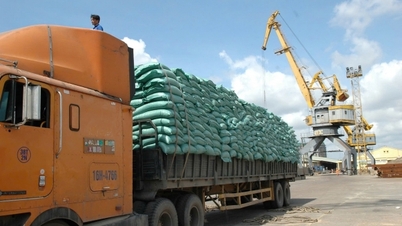



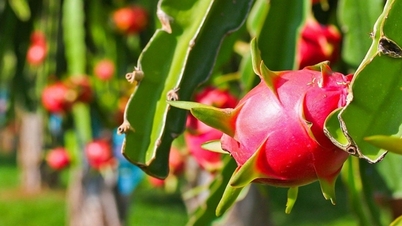



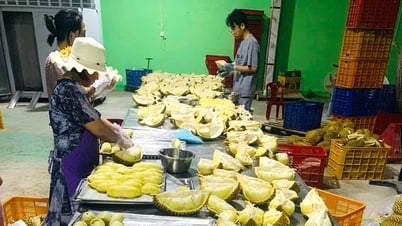

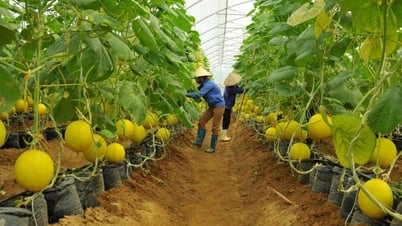

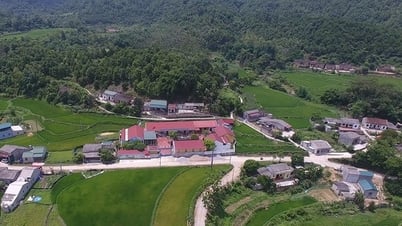

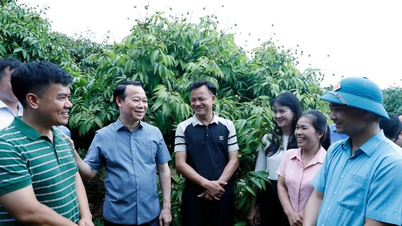
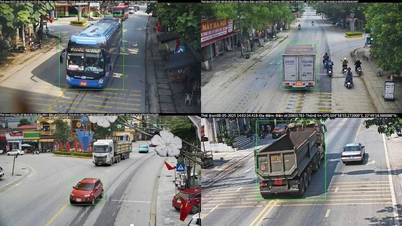








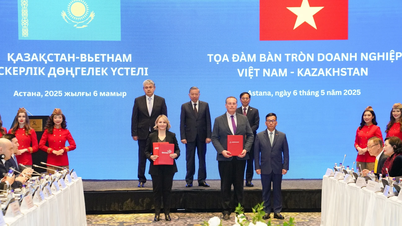














































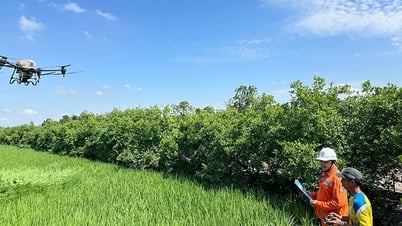


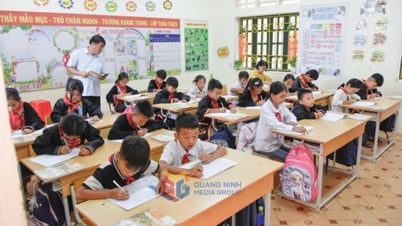




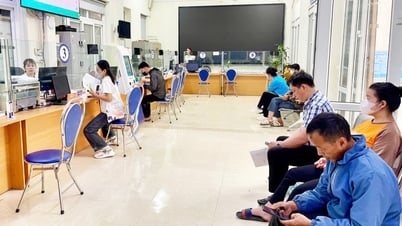










Comment (0)